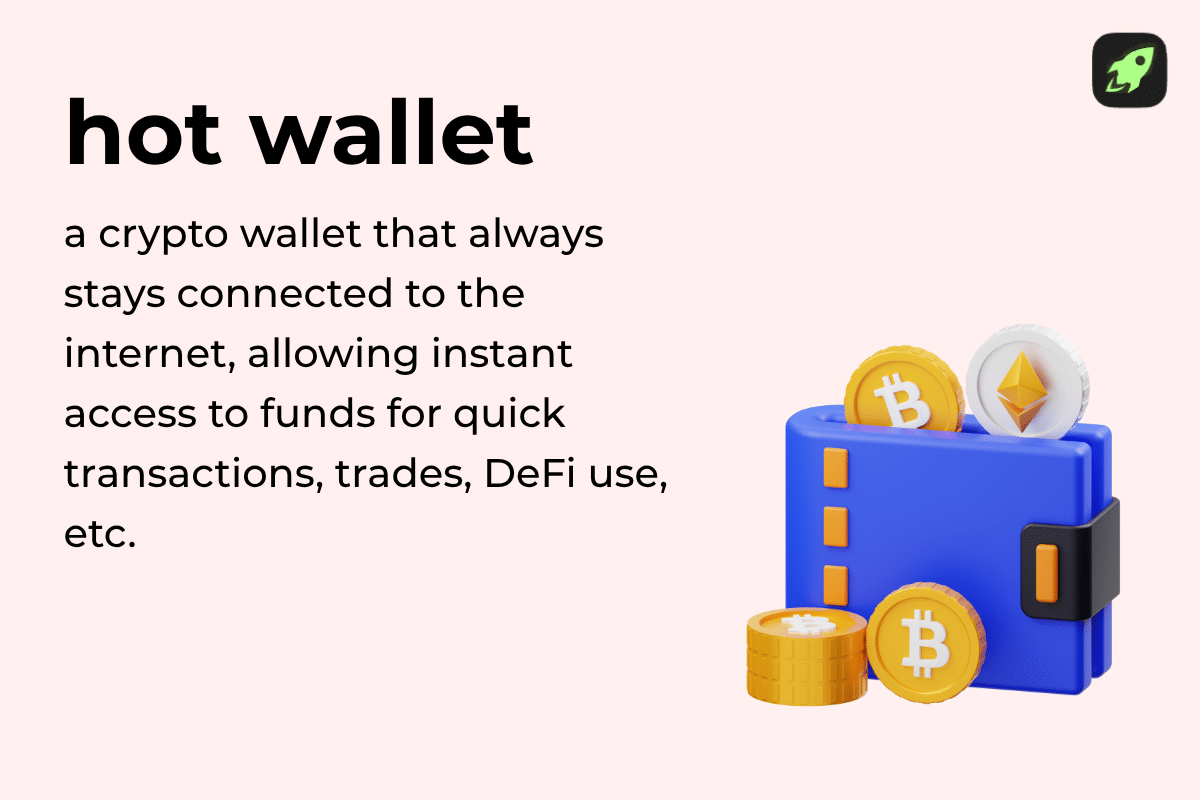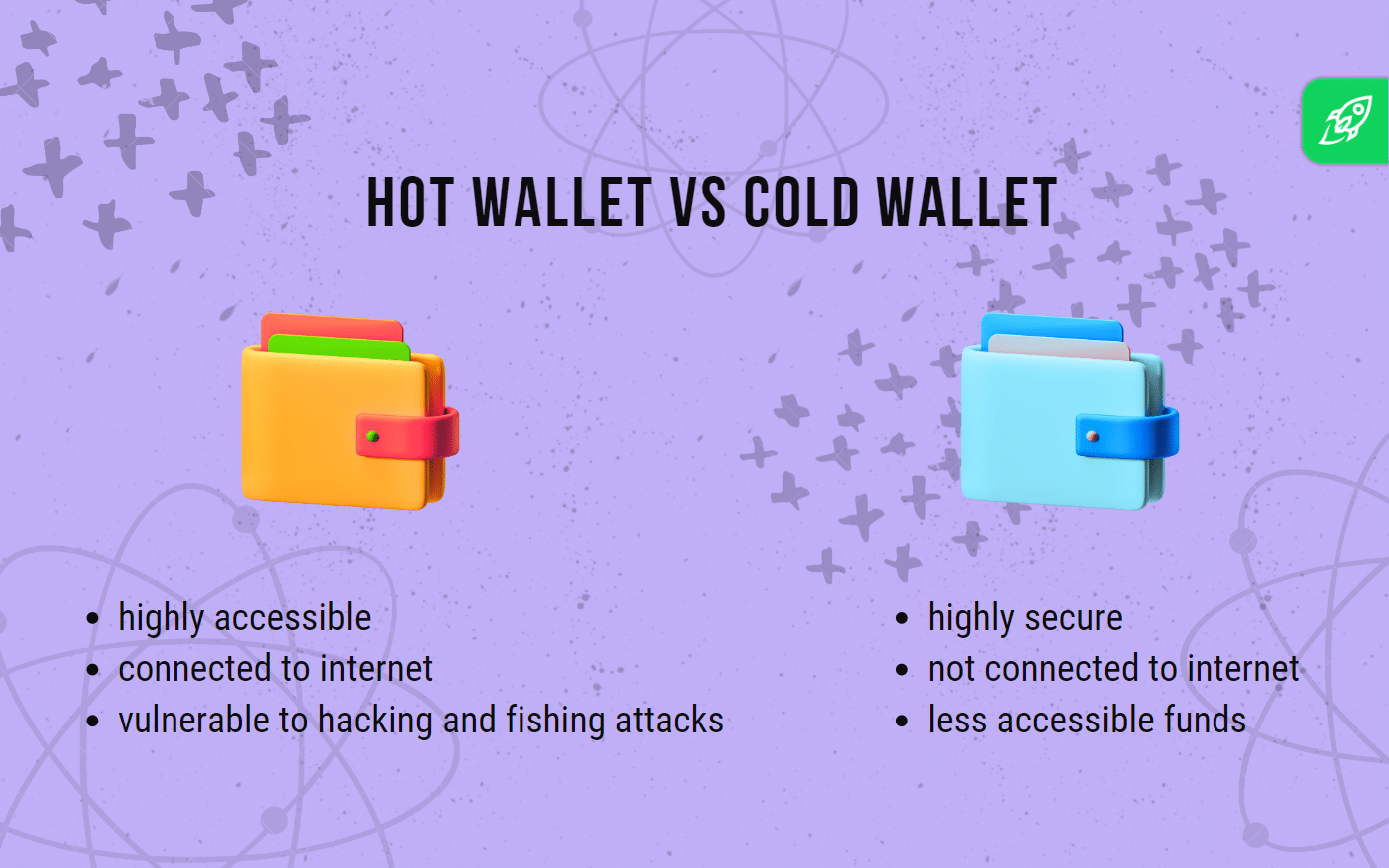You want your crypto close, not locked away forever. That’s where a hot wallet comes in—it keeps your coins ready for action, not buried in cold storage. This guide breaks down how hot wallets work, how they compare to cold wallets, and what you can do to keep your digital assets safe while keeping them easy to reach.
Table of Contents
What Is a Hot Wallet?
A hot wallet is a crypto wallet that stays connected to the internet, giving you instant access to your digital assets anytime you need them. It’s often contrasted with a cold wallet, which remains offline and is used for long-term storage.
Hot wallets are designed for speed and convenience. They let you store, send, and receive cryptocurrency directly from an online device such as your phone, desktop, or browser. Unlike offline storage options, a hot wallet keeps your private keys on an internet-enabled device, allowing quick access for transactions or DeFi activity.
That constant connectivity makes them the go-to choice for active users who want control over funds at a moment’s notice—but it also means they require careful security to keep your assets safe.

How Hot Wallets Work
Understanding hot wallets is simple: they work by keeping your private keys online so you can send, receive, and manage crypto instantly. They connect you directly to the blockchain, letting you approve transfers and interact with decentralized applications (dApps) in real time. Let’s go through each step of that process in more detail.
- Keys Stay Online
A hot wallet stores your private keys on an internet-connected device, like your phone or laptop. Those keys give you control over your address and crypto. - Transaction Signing
When you send crypto, the wallet uses your private key to sign the transaction, proving ownership without revealing your identity. - Blockchain Confirmation
The signed transaction is sent to the blockchain, where validators confirm and record it. - Security Layer
Your keys are protected with encryption, a password or PIN, and sometimes two-factor authentication (2FA). Most wallets also create a seed phrase, which is a 12- to 24-word backup that lets you restore access. - Always Active
Because hot wallets are always online, they’re perfect for frequent transactions and dApps. Just remember—more connectivity means more risk, so strong security measures are non-negotiable.

What Is the Difference Between a Hot Wallet and a Cold Wallet?
Hot wallets and cold wallets both store your crypto, but the way they do that is totally different. The main contrast is an internet connection: Hot wallets stay online for quick access, while cold wallets remain offline for stronger security. Stay informed about their differences and see how they compare.
| Feature | Hot Wallet | Cold Wallet |
| Internet Connection | Always connected to the internet, enabling instant access to funds | Only go online when you need to transfer |
| Private Key Storage | Stored on an online device (phone, desktop, or browser) | Stored on an air-gapped device like a hardware wallet |
| Access & Use | Ideal for frequent transactions, quick trades, and DeFi | Best for long-term storage of larger amounts |
| Security Level | Higher risk of online threats like phishing and malware | More secure—immune to conventional malware or hacking |
| Physical Risks | None—entirely online | High—loss, damage, theft, etc. |
| Cost | Usually free, or low-cost software | Requires a hardware device (one-time purchase) |
| Recovery | Uses seed phrase backups | Uses seed phrase or paper wallet backups |
| Best For | Active users who value convenience | Investors focused on long-term safety and storage |
Types of Hot Wallets
Hot wallet types all depend on how you prefer to access funds and store keys. Each type trades off between convenience and security, so this list will help pick what fits your routine.
Mobile Wallets
A mobile wallet is a smartphone app that gives you quick access to your digital assets. It stores private keys locally, secured with encryption and 2FA. They’re great for day-to-day transfers, support multiple cryptocurrencies, and work with dApps. There is one downside, though. Your phone’s always online, so weak security measures can expose you to phishing or malware.
Desktop Wallets
A desktop wallet runs on your computer and stores private keys securely on your drive. Some can stay offline until you make a transaction, making for a good balance of hot and cold wallets. They’re great for managing larger funds—wallets like Exodus offer multi-asset support, seed phrase recovery, and multi-signature options. Just keep your system clean, since malware or skipped updates can weaken your security.
Browser-Extension Wallets
A browser-extension wallet lives in your web browser, linking your crypto directly to Web3 by letting you sign on-chain transactions instantly. Still, constant internet connectivity raises phishing and malware risks—always verify sites and enable 2FA.
Web-Based Wallets
A web wallet runs in your browser through a hosted service. It can be custodial (the provider holds your private keys) or non-custodial (you control them).
It’s convenient—you can access your crypto assets from any device with a connection—but everything depends on the provider’s security. Use it for smaller amounts, back up your seed, and verify the site’s SSL before logging in.
Why Use a Hot Wallet?
You should use a hot wallet when you want your crypto ready to move. They’re designed for speed and easy access, giving you control over your funds anytime you’re online.
Because they’re always online, you can send and receive cryptocurrency, interact with DeFi and NFT platforms, or trade on crypto exchanges.
Read more: Wallet vs. Exchange: What’s the Difference?
Most hot wallets are free or low-cost, support multiple cryptocurrencies, and work across devices, keeping all your digital assets in one place. In short, a hot wallet gives you everyday convenience without the friction of cold storage.

How to Get Free Crypto
Simple tricks to build a profitable portfolio at zero cost

Are Hot Wallets Safe?
They’re generally safe if you use them wisely. Hot wallets are built for speed, not holding assets long-term, so risk depends on how you treat yours. Strong encryption, 2FA, and a clean device are essential. Non-custodial hot wallets give you more control, but you’re also responsible for your seed and backups.
For daily transfers and small balances, they’re safe—just stay alert and use smart security measures.
How to Keep Your Hot Wallet Safe
Keeping a hot wallet safe isn’t actually that complicated—it just takes good habits. Here’s a checklist to lock it down so there’s no trouble.
- Use Strong, Unique Passwords
Create complex passwords and never reuse them. Combine letters, numbers, and symbols. A password manager can help keep them organized and encrypted. - Enable Two-Factor Authentication (2FA)
Turn on 2FA wherever possible. Any good wallet should support it. This adds an extra layer of protection, even if someone steals your password. Use an authenticator app, not SMS codes. - Keep Software and Devices Updated
Outdated wallets and operating systems open the door to malware. Always install official updates when they come out, and download only from verified sources. - Back Up Your Seed Phrase Offline
Write your seed phrase (the recovery key to your wallet) on paper or a metal backup—not in a cloud file or screenshot. Store it somewhere private and secure. - Avoid Phishing Links and Fake Apps
Scammers mimic real sites and wallet apps. Always check URLs, use bookmarks for logins, and never share your private keys or seed phrase with anyone. - Use Trusted Networks
Avoid public Wi-Fi when managing funds. A VPN can reduce exposure when you have no choice, though. - Limit the Amount You Keep Online
Hot wallets are best for day-to-day transactions, not significant funds. Move long-term holdings to cold storage or a hardware wallet.
How to Choose a Hot Wallet
When choosing the right wallet, you want something reliable, secure, and built for how you use crypto. Here’s what to check for before you download anything.
Supported Cryptocurrencies
Make sure the wallet supports the coins you actually use. Some can handle multiple cryptocurrencies across different blockchains, while others focus on just one network.
Always check official documentation before transferring funds. For example, Coinbase Wallet’s supported assets list shows compatibility with Ethereum, Solana, and many EVM chains, while Exodus lists over 280 different supported types.
Security Features
Look for wallets that include 2FA, encryption, and optional multi-signature support. These features help secure your private keys against online threats. Plus, always download from verified sources and keep your software updated.
Non-Custodial/Custodial Wallets
A non-custodial wallet allows users to control their keys and seed phrase by themselves. Meanwhile, a custodial wallet (like an exchange wallet) holds your keys for you, trading control for convenience. Choose based on how confident you are in managing your own security measures.
Compatibility with dApps and NFTs
If you use dApps, make sure your wallet supports dApp integration and smart contracts. Wallets like MetaMask let you interact with NFTs and DeFi platforms directly through your browser or app.
Community Reputation and Developer Support
Use wallets that have active development and transparent security practices. Check how often they release updates, respond to bugs, and communicate with users. A strong community often means faster fixes and better security over time.
Examples of Popular Hot Wallets
Now that you know the details of how hot wallets work, take a look at some of the most popular hot wallets in the cryptocurrency ecosystem to help you choose.
- Coinbase Wallet: A non-custodial wallet for mobile and browser use. It supports many cryptocurrencies across different blockchains and works easily with dApps and NFT platforms.
- MetaMask: The go-to browser-extension wallet for Ethereum and other EVM-compatible networks. It’s a favorite in the DeFi space for smart contract interaction and on-chain transactions.
- Trust Wallet: A mobile wallet owned by Binance, known for its clean interface and support for thousands of assets. It includes a built-in dApp browser and seed recovery.
- Edge Wallet: Focuses on user privacy with client-side encryption, 2FA, and password recovery via a simple login system. It’s ideal for everyday transfers.
- Exodus: A visually polished desktop and mobile wallet supporting around 300 digital assets. It offers multi-signature options, in-app swaps, and hardware integration.
- Electrum: One of the oldest and most trusted software wallets for Bitcoin. Lightweight, open-source, and compatible with hardware devices for added security.
- MyEtherWallet (MEW): A web-based wallet for Ethereum and ERC-20 tokens. It allows non-custodial access, seed backup, and direct smart contract interaction.
Pros and Cons of Hot Wallets
Hot wallets keep things fast and convenient, but as we’ve seen, they’re not perfect. Take a look at this essential list of their core strengths and weaknesses.
| Pros | Cons |
| Always online for instant use | Exposed to phishing and malware |
| Better for day-to-day transactions and dApps, etc. | Bigger attack surface. Higher risk. |
| Usually free, or low-cost apps | No hardware layer for protection |
| Easy for beginners, quick to start | Needs updates and strong security |
| Non-custodial wallets give full control | Losing seed phrase = losing funds |
| Great for small, active balances | Not for long-term storage |
Final Thoughts: Are Hot Wallets Right for You?
If you want fast access to the crypto world and to make frequent transactions, hot wallets are your best bet. They’re made for everyday use, trading quickly, and trying out dApps or DeFi tools. Still, keeping too many assets online always adds risk, no matter how strong your security is. That’s why most people use both a hot wallet for spending, and a cold wallet for storing crypto long-term.
You should try to find the right balance. Keep your trading coins hot and your savings cold. Stay updated, back up your seed phrase, and always keep learning new ways of improving your security.
FAQ
Do I need the internet to use a hot wallet?
Yes. A hot wallet must stay connected to the internet to send or receive crypto and interact with the blockchain.
Can I use a hot wallet with DeFi and NFTs?
Absolutely. Most hot wallets connect directly to dApps and smart contracts, letting you trade, stake, or manage NFTs easily.
Can I send crypto directly from a hot wallet to an exchange?
Yes, you can. Just enter your exchange wallet address, confirm the on-chain transaction, and your funds will transfer once it’s verified.
Can I recover my crypto if I lose access to my hot wallet?
Yes—if you have your seed phrase. Restore it in the same wallet or another compatible one to regain access to your assets.
Is it safe to keep all my crypto in a hot wallet?
No. It’s safer to keep only small, active balances online and move significant funds to cold storage for protection.
Can I use a hot wallet on more than one device?
Yes, as long as the wallet supports multi-device sync. Just make sure each device is secure and never share your seed phrase anywhere.
Disclaimer: Please note that the contents of this article are not financial or investing advice. The information provided in this article is the author’s opinion only and should not be considered as offering trading or investing recommendations. We do not make any warranties about the completeness, reliability and accuracy of this information. The cryptocurrency market suffers from high volatility and occasional arbitrary movements. Any investor, trader, or regular crypto users should research multiple viewpoints and be familiar with all local regulations before committing to an investment.


